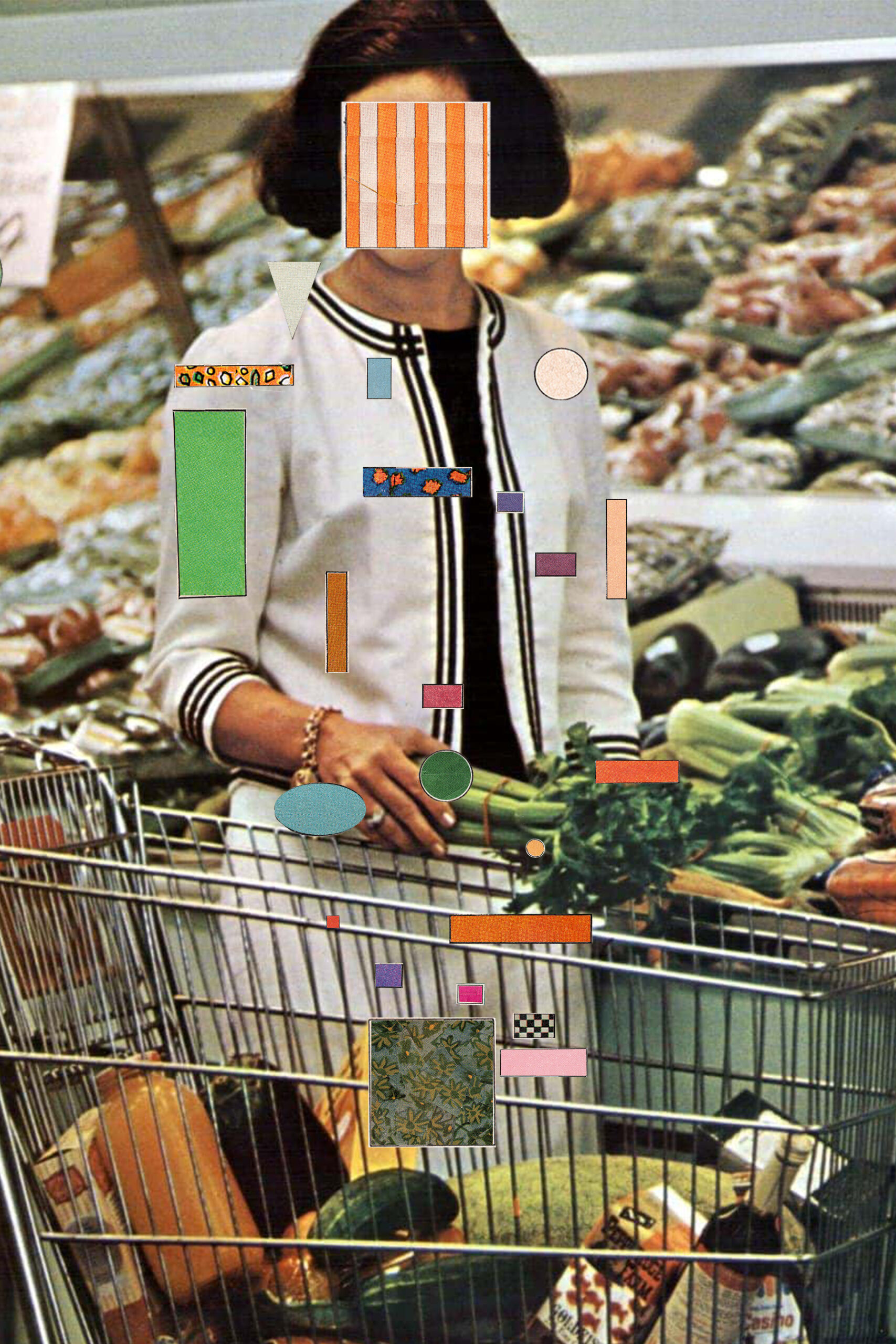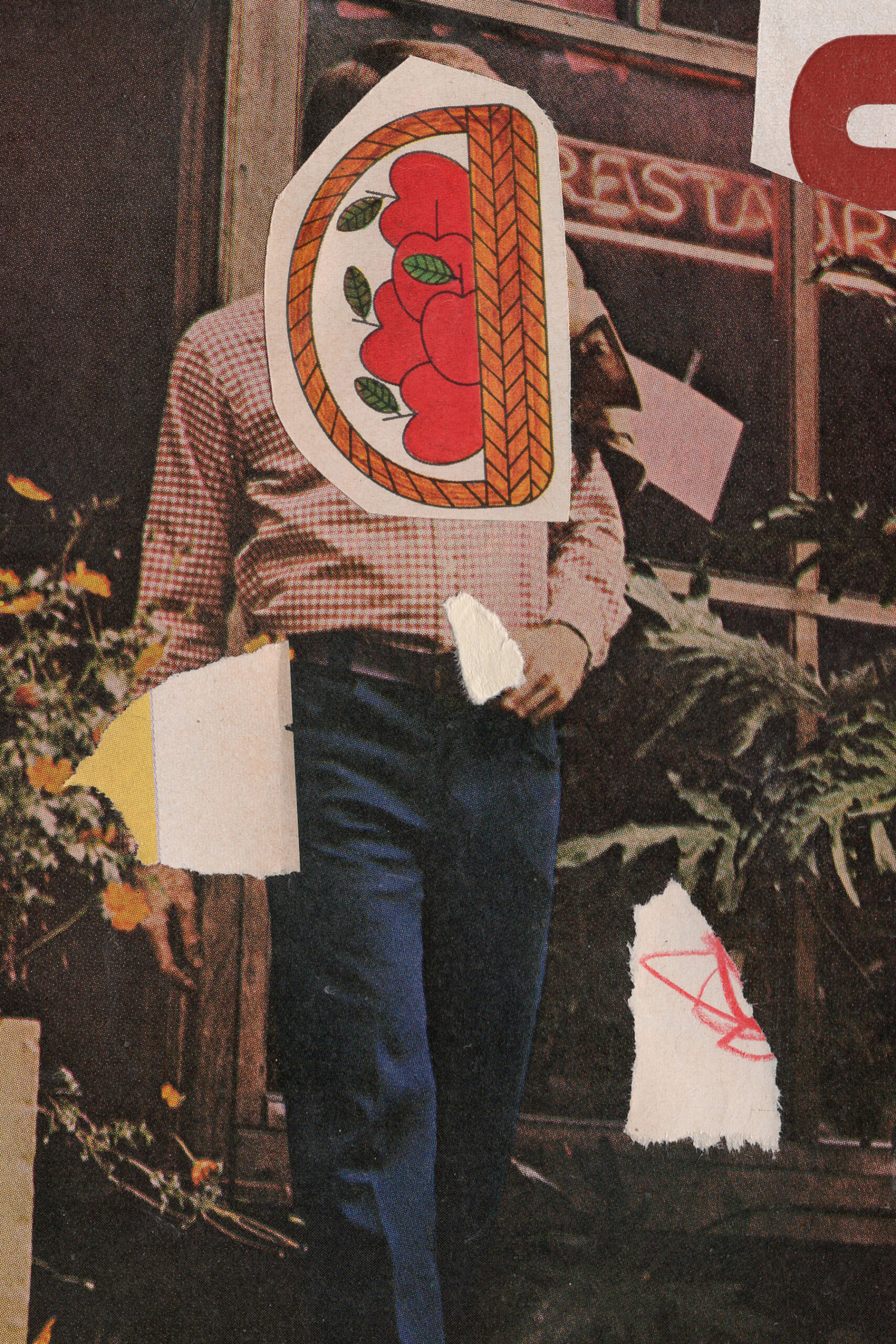“Who killed the pork chops? What price bananas? Are you my Angel?”
- I mutter affirmations in the rain of the produce aisle, light mist whispering onto green fennel fronds. This kale will NOT rot in my fridge! I WILL make the meals I am envisioning! Grocery shopping is an act of optimism. It’s a bet with myself on the type of person I’ll be in the coming days. Once, while shopping for a brief attempt at the Whole30 diet, the cashier chirped, “Lots of good stuff in here!” as she bagged my cart full of greens. It felt like I’d reached a new tier of the self-realization pyramid – no matter that I’d give up after a handful of days. Ultimately the wager isn’t so much that I’ll use the bunch of asparagus, but rather that I’ll live to throw it out. Even in the harsh fluorescent light of an evil supermarket conglomerate, the vibrant colors of swiss chard can feel like a miracle. In this sense, each jotted down item on my scattered list can be read as a prayer.Of course, though, there are times when the bet doesn’t pan out. People die with refrigerators full of food, or in the middle of a sentence. Leaving in their wake a lingering silence, and rot.
- On a random Youtube cooking show, chef Matty Matheson is standing in Diplo’s kitchen, and Diplo is saying that he doesn’t really keep groceries at the house. He’s only home two days a month. Diplo unearths a bag of moldy pita from one of his cabinets, and the two wheeze with laughter. Matty Mattheson claps two slices together, and dust bursts into the air.Aspiration can slide quickly into delusion,. I ask for a to-go box at a restaurant for leftovers I know I won’t eat. I bring a carton of strawberries on a long car ride that I’m almost certain will sour. A dreaded ritual among my roommates: cleaning out the fridge, claiming what is ours. I try to pretend the slice of pizza I’d wrapped and forgotten about on the top shelf isn’t mine, but everyone knows the truth. My ears burn with light shame, the guilt of being wrong.
- What I mean to say is, there’s privilege in waste. A friend tells me she once kept a list of everything she threw out for three months. Confronting my own such archive would, I think, prove more than I could bear.
- The supermarket is a symbol of American consumerism, connoting images of the bored housewife and a culture of convenience. The first American self-serve supermarket, a Piggly-Wiggly, was built in Memphis in 1916. For the first time, customers could choose their own items from eye-level shelves, instead of telling a clerk behind the counter what they need. This necessitated a new emphasis on product branding and marketing, as companies competed for consumers’ attention.
Sometimes I marvel at my own restraint, that I don’t just buy a jar of vanilla Betty Crocker frosting and eat it straight with a spoon, feral and hunched against the tiled kitchen counter. When I think about the task of keeping myself alive, it suddenly seems impossible. I panic-eat a baby carrot. - In their 1979 song, “Fairytale in the Supermarket,” The Raincoats lament, or perhaps, rejoice: No one teaches you how to live!
- My mom loves to throw things out. She hates clutter. I hang onto everything: clothes, knick-knacks, books, ideas, old glue sticks and papers, random cords and plugs. I cling to the potential of use, the future satisfaction of needing something and having it. Just in case, I shrug, as I move from apartment to apartment, boxes full of items with no discernible purpose.
An early quarantine video on the Bon Appetit Test Kitchen channel asks ten chefs to find and discuss the oldest food items in their kitchen. The results include three year-old leftover biryani, six year-old tamarind paste, a nine year-old fruitcake. In many cases, the items are gifts, like pistachio spread from Italy or chuño from the Andes mountains.One of the chefs explains: “We haven’t used it because what if we can’t find it anywhere else? What if it’s amazing, and we want more?” Some others were being saved for a special occasion and instead went bad. The video makes me unreasonably forlorn.

- On our first trip to Whole Foods together, my then-boyfriend surveyed our cart and said something like, “This should last us the week.” Implying, it felt, that we would share many more. And we did, weeks and years of after-work pastas and smoke-detector chicken, planned meals we forewent in favor of nights out, domesticity slipping into a slog of monotony, bickering matches over dirty dishes and divisions of labor. At the beginning, though, even the mundanity of grocery shopping felt abundant with possibility. Shortly after we broke up, someone asked me out in that same Whole Foods as I stood examining heirloom tomatoes. I smiled and said no.
- Grocery shopping took on a new novelty during quarantine. For a time, it felt like the only thing to look forward to. I’d comb through cookbooks and food blogs beforehand, scrawling ingredients to recipes I was excited to try. It was a thrill to leave the house and be surrounded by people, a once dreary task turned into an unexpected life force, suddenly expected to fill new voids of isolation and interiority. I learned to see the city through supermarkets: discerning the politics and stock of various stores, from bargain shopping like Smart + Final and Food 4 Less to boutique markets like Cookbook and Erewhon. Despite its pseudo-sociality, though, shopping is an intensely individualized act. We move through aisles purchasing mass-produced items for our atomized households, making arbitrary decisions between an abundance of choices. When I ask a cashier in the spring of 2020 if it seems like customers are being kinder or more patient since the lockdown began, he just laughs. “All I can say is that people are still people.”
- My grandpa worked in supermarkets for the entirety of his working life. He tells stories of his lengthy career – of the pride in becoming manager or the frenzy of keeping shelves stocked during an infamous Boston blizzard. None of the stories are particularly interesting, but I like that he tells them. He still reads mailers for Star Market and Stop and Shop, circling discounts and deals in red sharpie. He watches The Price is Right every morning, keeping a notebook to record his guesses as to how much things cost.
When I tell my grandpa about the discourse around essential workers and new organizing efforts, he is surprisingly unmoved. “I was never a union guy,” he says. He insists the union leaders always drove around the biggest cars, and never helped fight for better contracts or conditions. I wonder if this is true. He’s 94 now and rarely leaves the house. One of the few places he still goes is the supermarket. - As a child I loved the idea of self-checkout and would get a kick out of scanning and bagging my own items. My mom didn’t like it. She worried it would take away people’s jobs. The great promise of automation is to free humans from more tedious tasks and let machines do the work. Self-checkout proves, however, that automation doesn’t shift labor to machines, as we may have hoped, but rather transfers what was once waged-work into unpaid labor performed by someone else.
- Now I use self-checkout for the tricks. Only scanning every few items, perhaps, or ringing in expensive nuts as cheap grains. Copaganda warns that shoplifting has become an “epidemic.” I notice more and more stores locking up essential items: toothbrushes, hair products, soap, in an act of shameless cruelty. In Von’s I ring a bell for an employee to unlock the case of chapstick.
Food-at-home prices have risen 13% in the last year, while over 60% of Americans are living paycheck to paycheck, and 1 in 10 households are struggling to feed their families. Forbes reports that profit inflation is responsible for over 50% of consumer price inflation. Prices are rising, and so are corporate profits. Prices are rising, and people are worried. Data confirming spikes in theft are fuzzy and incomplete at best, but even if it were true, I think – who could blame us? - If stealing from Whole Foods is a moral imperative, then putting your cart back is a form of labor solidarity. “There is no dire emergency,” the shopping cart theory posits. “Do you accept your duty to return the cart even though you gain nothing?”
I probably abide 95% of the time, but not all. - Some of the oldest items in the chefs’ kitchens in the Bon Appetit video are actually still usable, like a thirteen year-old yogurt starter or five year-old sourdough. Fermentation is, in a sense, controlled rot. It’s a way to combat waste and cheat time. These projects involve observation, labor, care, and also, often, community: I’ve received kombucha mothers from friends, distributed homemade loaves of bread to loved ones, taken advantage of community compost projects. Other forms of food justice, like community fridges and mutual aid distribution, address these ideas directly. Their missions each posit the classic organizing ethos: we take care of us. With enough shared knowledge and resources, we have everything we need. Against the backdrop of a failed state, such projects provide sites of revolution, regrowth, and hope.
- “Will we walk all night through solitary streets?” Ginsberg asks in A Supermarket in California. Capitalism wants us to think yes. Wandering through a Ralph’s ungodly brightness, past an assault of colorful boxes and saran-wrapped fruit, it’s easy to get, as The Clash sang, all lost in the supermarket. Perhaps we are encouraged to walk all night through solitary aisles. But, I believe, there are exits.


